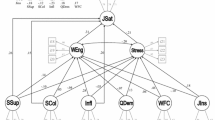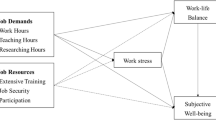Abstract
The managerial policies of higher education have caused important structural changes in terms of the casualization of academic labor and the acceleration of academic life, which have been detrimental to university faculty well-being. Despite the emergence of empirical studies adopting the job demands-resources (JD-R) model to examine the antecedents of university faculty well-being, more sophisticated studies focusing on variables critical for university academics in “accelerating” academia are urgently needed, given both the “super-complexity” of changing academic work environments and the heuristic nature of the JD-R model. This questionnaire investigation involved 1498 faculty members from 26 Chinese research universities and revealed that job demands have a significantly positive influence on both emotional exhaustion and organizational commitment. Moreover, the findings highlight the centrality of psychological empowerment in understanding the relations between job demands, job resources, and university faculty well-being.

Similar content being viewed by others
References
Acker, S., & Webber, M. (2017). Made to measure: Early career academics in the Canadian university workplace. Higher Education Research & Development, 36(3), 541–554.
Avolio, B. J., Bass, B. M., & Jung, D. I. (1995). MLQ multifactor leadership questionnaire: Technical report. Mindgarden.
Bakker, A. B., Demerouti, E., & Schaufeli, W. B. (2005). The crossover of burnout and work engagement among working couples. Human Relations, 58, 661–689.
Bland, C. J., Center, B. A., Finstad, D. A., Risbey, K. R., & Staples, J. G. (2005). A theoretical, practical, predictive model of faculty and department research productivity. Academic Medicine, 80(3), 225–237.
Cao, C., Shang, L., & Meng, Q. (2020). Applying the Job Demands-Resources Model to exploring predictors of innovative teaching among university teachers. Teaching and Teacher Education, 89, 1–10.
Cook, J., & Wall, T. (1980). New work attitude measures of trust, organisational commitment and personal need non-fulfilment. Journal of Occupational Psychology, 53(1), 39–52.
Crawford, E. R., LePine, J. A., & Rich, B. L. (2010). Linking job demands and resources to employee engagement and burnout: A theoretical extension and meta-analytic test. Journal of Applied Psychology, 95(5), 834–848.
De Jonge, J., & Schaufeli, W. B. (1998). Job characteristics and employee well-being: A test of Warr’s Vitamin Model in health care workers using structural equation modelling. Journal of Organisational Behavior, 19(4), 387–407.
Demerouti, E., Bakker, A. B., Nachreiner, F., & Schaufeli, W. B. (2001). The job demands-resources model of burnout. Journal of Applied Psychology, 86, 499–512.
Dodge, R., Daly, A., Huyton, J., & Sanders, L. (2012). The challenge of defining wellbeing. International Journal of Wellbeing, 2(3), 222–235.
Gill, R. (2010). Breaking the silence: The hidden injuries of the neoliberal university. In R. Ryan-Flood & R. Gill (Eds.), Secrecy and silence in the research process: Feminist reflections (pp. 228–244). Routledge.
Gmelch, W. H., Lovrich, N. P., & Wilke, P. K. (1984). Sources of stress in academe: A national perspective. Research in Higher Education, 20(4), 477–490.
Han, J. Y., Perron, B. E., Yin, H. B., & Liu, Y. M. (2020). Faculty stressors and their relations to teacher efficacy, engagement and teaching satisfaction. Higher Education Research & Development, Onlinefirst,. https://doi.org/10.1080/07294360.2020.1756747
Han, J. Y., Yin, H. B., Wang, J. J., & Bai, Y. (2019). Challenge job demands and job resources to university teacher well-being: The mediation of teacher efficacy. Studies in Higher Education, 45(8), 1771–1785.
Hayes, A. F. (2009). Beyond Baron and Kenny: Statistical mediation analysis in the new millennium. Communication Monographs, 76(4), 408–420.
Hegney, D., Tsai, L., Craigie, M., Crawford, C., Jay, S., & Rees, C. (2020). Experiences of university employees of the impact of a mindful self-care and resiliency program on their well-being. Higher Education Research & Development, Onlinefirst,. https://doi.org/10.1080/07294360.2020.1764508
Helm, S. (2013). A matter of reputation and pride: Associations between perceived external reputation, pride in membership, job satisfaction and turnover intentions. British Journal of Management, 24(4), 542–556.
Hu, L. T., & Bentler, P. M. (1999). Cutoff criteria for fit indexes in covariance structure analysis: Conventional criteria versus new alternatives. Structural Equation Modeling: A Multidisciplinary Journal, 6(1), 1–55.
Huang, Y. T., & Xu, J. (2020). Surviving the performance management of academic work: evidence from young Chinese academics. Higher Education Research Development, 39(4),704–718.
Huang, Y. T., Liu, H., & Huang, L. (2021). How transformational and contingent reward leaderships influence university faculty’s organizational commitment: The mediating effect of psychological empowerment. Studies in Higher Education, 46(11), 2473–2490.
Judge, T. A., & Piccolo, R. F. (2004). Transformational and transactional leadership: A meta-analytic test of their relative validity. Journal of Applied Psychology, 89(5), 755–768.
Larson, L. M., Seipel, M. T., Shelley, M. C., Gahn, S. W., Ko, S. Y., Schenkenfelder, M., Rover, D. T., Schmittmann, B., & Heitmann, M. M. (2019). The academic environment and faculty well-being: The role of psychological needs. Journal of Career Assessment, 27(1), 167–182.
Lepine, J. A., Podsakoff, N. P., & Lepine, M. A. (2005). A meta-analytic test of the challenge stressor-hindrance stressor framework: An explanation for inconsistent relationships among stressors and performance. The Academy of Management Journal, 48(5), 764–775.
Lynch, K. (2014). New managerialism: The impact on education. Concept, 5(3), 1–11.
Maslach, C., & Jackson, S. E. (1981). The measurement of experienced burnout. Journal of Organisational Behavior, 2(2), 99–113.
McCarthy, D., & Dragouni, M. (2020). Managerialism in UK business schools: Capturing the interactions between academic job characteristics, behaviour and the ‘metrics’ culture. Studies in Higher Education, Onlinefirst,. https://doi.org/10.1080/03075079.2020.1723524
Mudrak, J., Zabrodska, K., Kveton, P., Jelinek, M., Blatny, M., Solcova, I., & Machovcova, K. (2017). Occupational well-being among university faculty: A job demands-resources model. Research in Higher Education, 59(3), 325–348.
Schaufeli, W. B., & Taris, T. W. (2014). A critical review of the job demands-resources model: Implications for improving work and health. In G. F. Bauer & O. Hämmig (Eds.), Bridging occupational, organisational and public health: A transdisciplinary approach (pp. 43–68). Springer.
Spreitzer, G. M. (1995). Psychological empowerment in the workplace: Dimensions, measurement, and validation. Academy of Management Journal, 38(5), 1442–1465.
Su, S., & Baird, K. (2017). The impact of collegiality amongst Australian accounting academics on work-related attitudes and academic performance. Studies in Higher Education, 42(3), 411–427.
Sutton, P. (2017). Lost souls? The demoralization of academic labour in the measured university. Higher Education Research & Development, 36(3), 625–636.
Vostal, F. (2014). Towards a social theory of acceleration: Time, modernity, critique. European Journal of Social Sciences., 52, 235–249.
Vostal, F. (2016). Acceleration in the academic life-world. In: Accelerating academia. Palgrave studies in science, knowledge and policy. Palgrave Macmillan
Xanthopoulou, D., Bakker, A. B., Demerouti, E., & Schaufeli, W. B. (2007). The role of personal resources in the Job Demands-Resources Model. International Journal of Stress Management, 14(2), 121–141.
Xu, L. (2019). Teacher–researcher role conflict and burnout among Chinese university teachers: A job demand-resources model perspective. Studies in Higher Education, 44(6), 903–919.
Acknowledgements
We want to express our sincere thanks to all the participants who spared time to participate in this survey and we are very grateful for their contributions to this study.
Funding
This study is supported by 2021 Annual Key Projects of Zhejiang Province Association for Higher Education [KT2021035].
Author information
Authors and Affiliations
Corresponding author
Ethics declarations
Conflict of interest
No potential conflict of interest was reported by the authors.
Ethical approval
I confirm that all the subjects have provided appropriate informed consent and details on how this was obtained are detailed in the manuscript.
Additional information
Publisher's Note
Springer Nature remains neutral with regard to jurisdictional claims in published maps and institutional affiliations.
Rights and permissions
About this article
Cite this article
Huang, Y., Wang, C. Surviving and thriving in “accelerating” academia: toward a job demands-resources model of faculty well-being. Asia Pacific Educ. Rev. (2022). https://doi.org/10.1007/s12564-022-09769-2
Received:
Revised:
Accepted:
Published:
DOI: https://doi.org/10.1007/s12564-022-09769-2




